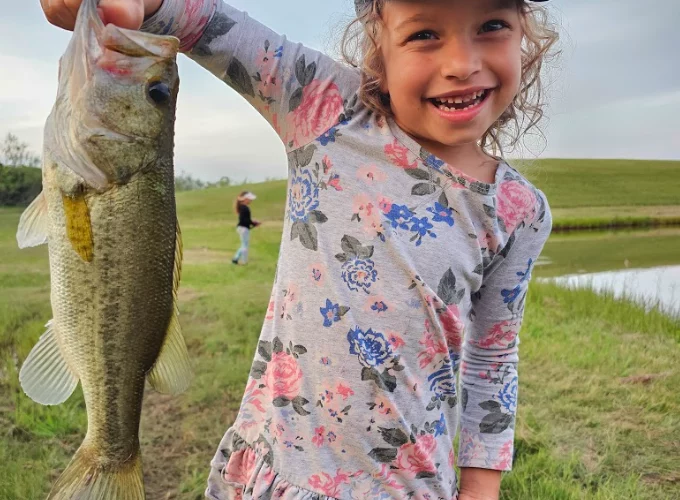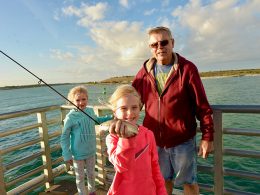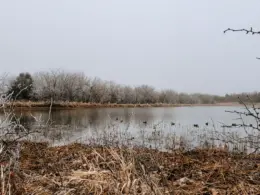“Reel it in, keep going, and pull up your rod!” I yelled as I hurried down the bank of the pond! Anytime one of my kids catches a fish; it is a moment of excitement. Emotions flood the air, and each fish deserves its own congratulatory shore party. Fishing outings bring on many emotions, such as eagerness and anticipation. Although, they can also be accompanied by frustration, and often impatience can be a challenge, especially with younger children. Fishing, in general, provides its own challenges, add children to the mix, and there may be an opportunity for chaos. However, introducing fishing to kids early on can produce a life-long fisher or angler.
Honestly, that’s the goal. As parents or guardians, we expose our children to outdoor skills with the hope they will use them throughout life. The outdoors gives us opportunities to create a lasting family legacy that can live on through future generations. The American outdoor hunting and fishing traditions hold roots in the beginnings of this land. Starting with the North American Indigenous tribes and following into the birth of the country. Learning how to fish also provides opportunities to pass on valuable skills. Acquiring the skill to fish provides the ability to obtain sustenance for one’s self and or family.
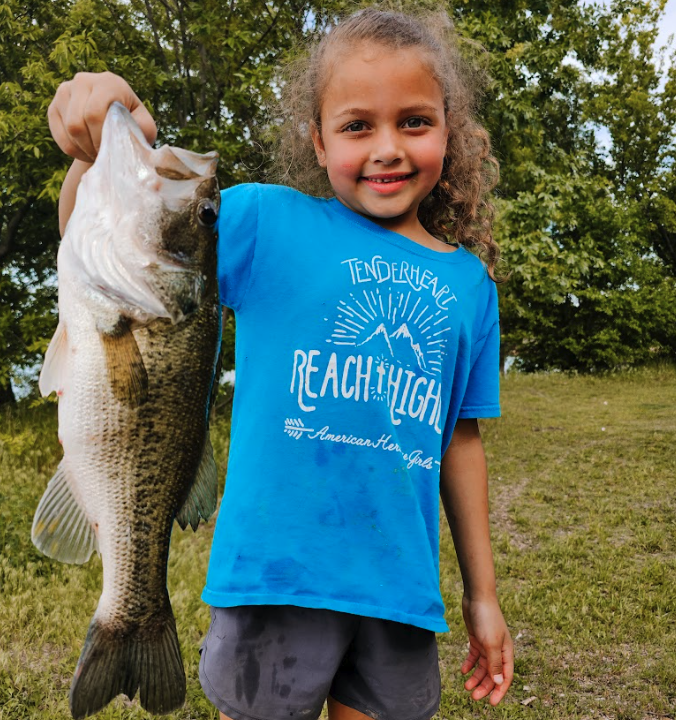
Off on the Right Foot
Most state wildlife agencies do not require kids to hold a fishing license. However, be sure to check the youth age limits for your state. This still provides the opportunity to walk them through the process and explain the importance of adhering to the laws. Read them the regulations and daily catch limits. It is likely that the information will enter one ear and exit out the other. Although, one day it will stick one day.
Fishing or Angling
Have you ever asked the question: what is the difference between angling and fishing? I used never to understand the difference between a fisherman and an angler. Angling is using a rod, bait, and hook to catch fish in eateries, rivers, and lakes. Fishing is using a rod or nets in open water, such as bays, oceans, and deep waters. The more knowledgeable you become, the easier it is to educate others. Kids are naturally curious and probably won’t work themselves up over the some legality of fishing definitions. Although you may be surprised by the amount of information kids can absorb. Many kids are eager to identify different fish species and the various baits. Kids can experience first-hand the balance of the food chain. You need an insect or small fish to catch a large enough fish to eat.
Like any other outdoor activity, we must remember safety first. Anytime you have a situation that involves children and water, you need life jackets for them. Instruct them on proper life jacket wear and how to put it on themselves.
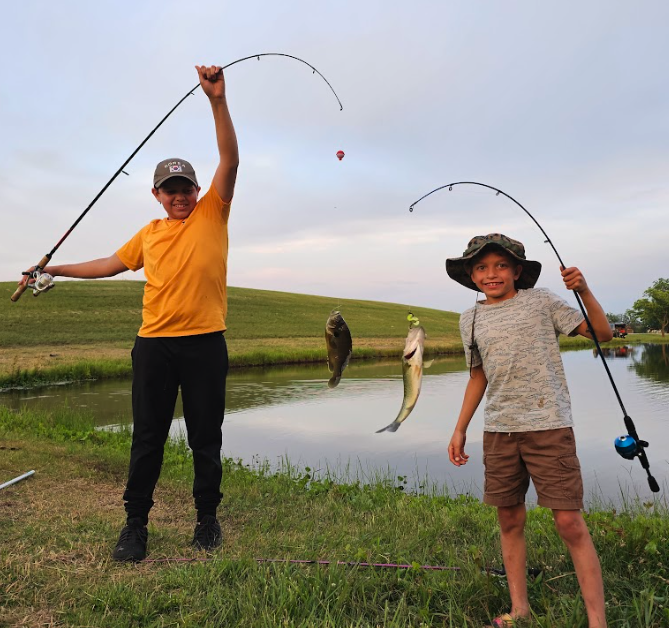
Forms of Fishing
Depending on where you are located and the water sources available, there are various forms of fishing you can partake in. Most people are familiar with bank or shore fishing. This is where you are stand on land fishing into water. This can be very fun, especially if you can access stock ponds. Some places have kid fishing only ponds that are stocked with fish. We frequently these often and practice catch and release. Sites like this help build confidence and refine techniques.
We had a pontoon for a while, and that was another fun way to teach kids to fish. They were learning to watch the fish finder and fish at deeper depths. We also used jug lines made from PVC pipe and foam noodles with a concrete weight attached at the bottom of the line to fish for catfish. However, boating brings safety concerns of its own. Most outdoor activities require some form of caution and safety warning. Do not allow fear to keep you from engaging with kids in the outdoors.
Tackle
Tackle is a vital piece to fishing. You can get really into the various rods, lures, various lines, and hooks. However, it is important to start with the basics when teaching kids how to fish. Invest in age-appropriate fishing gear for your kids. Purchasing gear that is easy for them to use and handle will help things go more smoothly. It is a good rule of thumb, to begin with targeting smaller fish. Small fish will be easier and quicker to catch. Kids are easily discouraged and lose morale faster than most. So, using tackle that targets smaller fish at first will set our little anglers on the right foot and hopefully with better attitudes. One thing about fishing with kids is they are going to get their lines stuck, tangled, and break off many hooks and bobbers. Unfortunately, at first, many parents spend more time rigging rods and baiting hooks than actually watching their kids catch fish.
When looking for a fishing rod, most youth poles you get at the local department store will do the job. Again, start with a small hook, bobbers, and worms. Once they get familiar, teach them how to tie on their own hook. Furthermore, learning to remove a hook would be the following task for them to acquire. Most kid poles come with a dummy fish, but they are sold separately if you need one. Use the fish to allow them to practice tying something to their lines. This is a good time to teach them to cast and reel. I allow my littles to have “practice days” in the yard or while older kids are fishing. They cast out their dummy fish and reel them. Like any other sport, practice makes perfect.
Snacks
If you have a child, you probably already know snacks are crucial for any outdoor venture. Snacks serve a couple of purposes while fishing. First, they help pass the time. Kids grow bored very easily while waiting. Having snacks to munch on helps pass the time. Honestly, I’m sure many of us adults also test out our patience meter on a day fish are not biting.
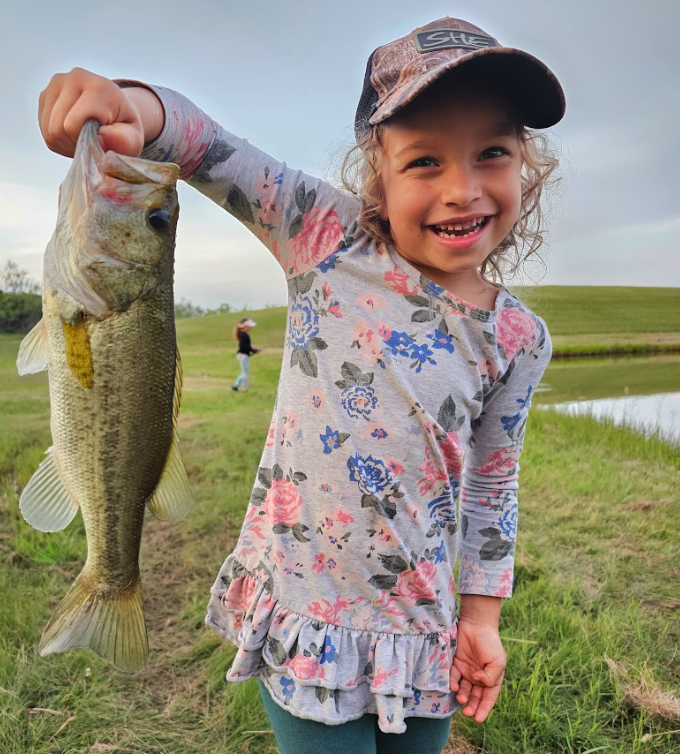
Additionally, fishing is typically a couple of hours to all day event. It is vital to eat and stay hydrated when engaging in any outdoor activity. Kids tend to get busy and forget to eat and drink. They need to be reminded. Providing meals and snacks during your fishing venture keeps them happy and healthy. Here are a few snack suggestions:
- Fruit and cut vegetables
- Seeds and nuts
- Sandwiches
- Rolled-up deli meat cuts with cheese
- Crackers and chips
- Granola bars
Anytime spent in the outdoors requires fuel. Kids are easily dehydrated and are not able to monitor their blood sugar as easily as adults. This typically begins to show itself in the form of a tantrum and or cranky kids. Stay ahead of the bad-tempered episodes and pack snacks and drinks ahead of time. Anytime snacks are involved; you have an opportunity to teach children to clean up after their selves. This is a role they can play in conservation. They are learning to keep habitats clean and respect the environment.
Valuable Lessons
The outdoors provides many occasions to learn valuable lessons and helps children develop. According to a research study conducted by the University of Wisconsin-Stevens Point, outdoor education through play and outdoor skills support emotional, behavioral, and intellectual development. Their research studies concluded that children who learn outdoors develop: senses of self, independence, confidence, creativity, decision-making and problem-solving skills, self-discipline, and initiative.
Make it FUN!
Fishing with kids should be a fun and enjoyable experience. Remember, we are creating lifelong impressionable childhood memories. Make an effort to keep the mood positive and entertaining. In general, fishing with kids can be a great way to spend quality time and make lasting memories. As adults, we often need to lower our expectations. Do not expect your child to catch a fish every time you go out. In addition, this may provide opportunities to teach good sportsmanship. I had taken my five children out on various fishing outings when only one child caught a fish or all, but one caught a fish. This is where we teach you can be happy, excited, and proud, but you should still be encouraging and positive toward the other children.
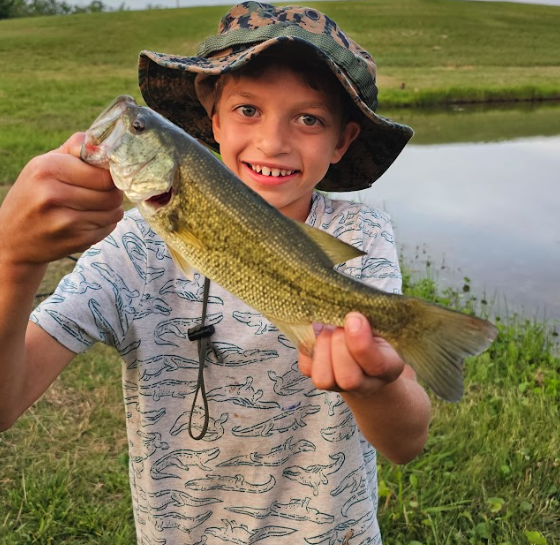
Additionally, you teach the child who is still eagerly trying to be positive and happy for others. I always say, “If you want people to be happy for you, be happy for them when it’s their time to shine.” Kids need to learn sometimes the “fish ain’t biting.”
Take breaks, and step away from the poles for a bit. This is important, especially with younger kids. I make up mini scavenger hunts. For example, collect shells, find cool rocks, can you spot any wildlife, or take a walk around.
If you find yourself fishing with children, I hope these tips help you on your journey. Each fishing adventure equals another memory. Each is equipped with its own lessons, trials and errors, and successes. Children learn by seeing and doing. If you don’t prioritize the outdoors, they will not either. If you love to fish, so will they! They will also value learning if you show you can always learn something new. Happy Fishing!

